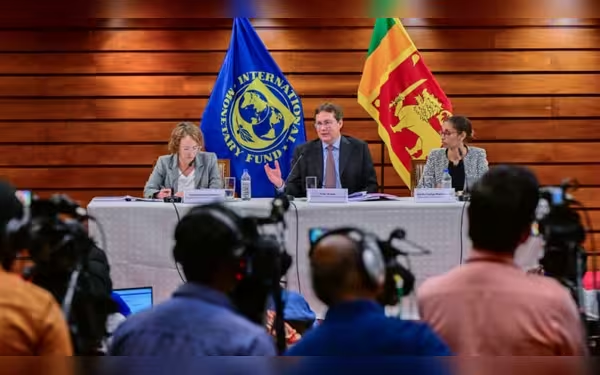Sunday, December 22, 2024 09:00 PM
Sri Lanka's Government Commits to IMF Bailout Program
- Sri Lanka continues IMF bailout amid economic crisis.
- New government emphasizes adherence to IMF 'guardrails'.
- Austerity measures may impact citizens' welfare.
 Image Credits: channelnewsasia
Image Credits: channelnewsasiaSri Lanka's new government commits to IMF bailout, emphasizing economic recovery amid ongoing challenges.
In recent developments, Sri Lanka's new leftist government has made a significant decision to continue with a controversial bailout program from the International Monetary Fund (IMF). This decision comes as the country grapples with the aftermath of an unprecedented economic crisis that led to a default on its external debt of US$46 billion in April 2022. The IMF announced on November 23 that it has reached an agreement with President Anura Kumara Dissanayake's administration to proceed with a four-year loan that was initially negotiated by the previous government.
The IMF's team leader, Peter Breuer, emphasized the importance of the new government's commitment to adhere to the "guardrails" of the program. This commitment is crucial for ensuring policy continuity, which is essential for the country's economic recovery. Breuer stated, "Sustaining the reform momentum is critical to safeguarding the hard-won gains of the programme, and putting the economy on a path towards lasting recovery and stable and inclusive growth." This highlights the IMF's focus on maintaining a structured approach to economic reforms, even amidst political changes.
The backdrop of this agreement is a dire economic situation in Sri Lanka, characterized by a severe shortage of foreign exchange. This shortage has severely impacted the country’s ability to import essential goods, including food and fuel, leading to widespread protests and the resignation of former President Gotabaya Rajapaksa. The US$2.9 billion loan secured last year mandated the government to implement tough measures, such as increasing taxes, eliminating energy subsidies, and restructuring over 50 state-owned enterprises that were operating at a loss.
As Sri Lanka navigates these challenging waters, the continuation of the IMF program is seen as a double-edged sword. On one hand, it provides much-needed financial support and a framework for economic recovery. On the other hand, the austerity measures required may lead to further hardship for the citizens already struggling with the effects of the economic crisis. The government's ability to balance these reforms while ensuring the welfare of its people will be critical in the coming months.
Sri Lanka's decision to stick with the IMF bailout program reflects a commitment to economic reform and recovery. However, the path ahead is fraught with challenges. The government must navigate the delicate balance between implementing necessary reforms and addressing the immediate needs of its citizens. As the situation unfolds, it will be essential for the government to communicate transparently with the public and ensure that the sacrifices made today lead to a more stable and prosperous future for all Sri Lankans.













